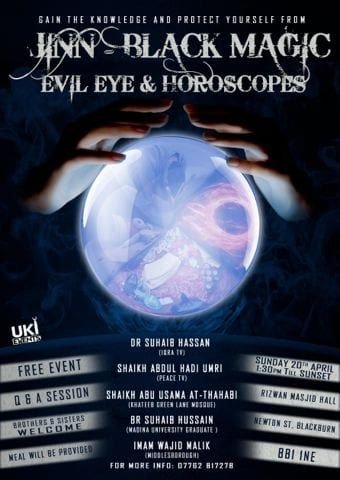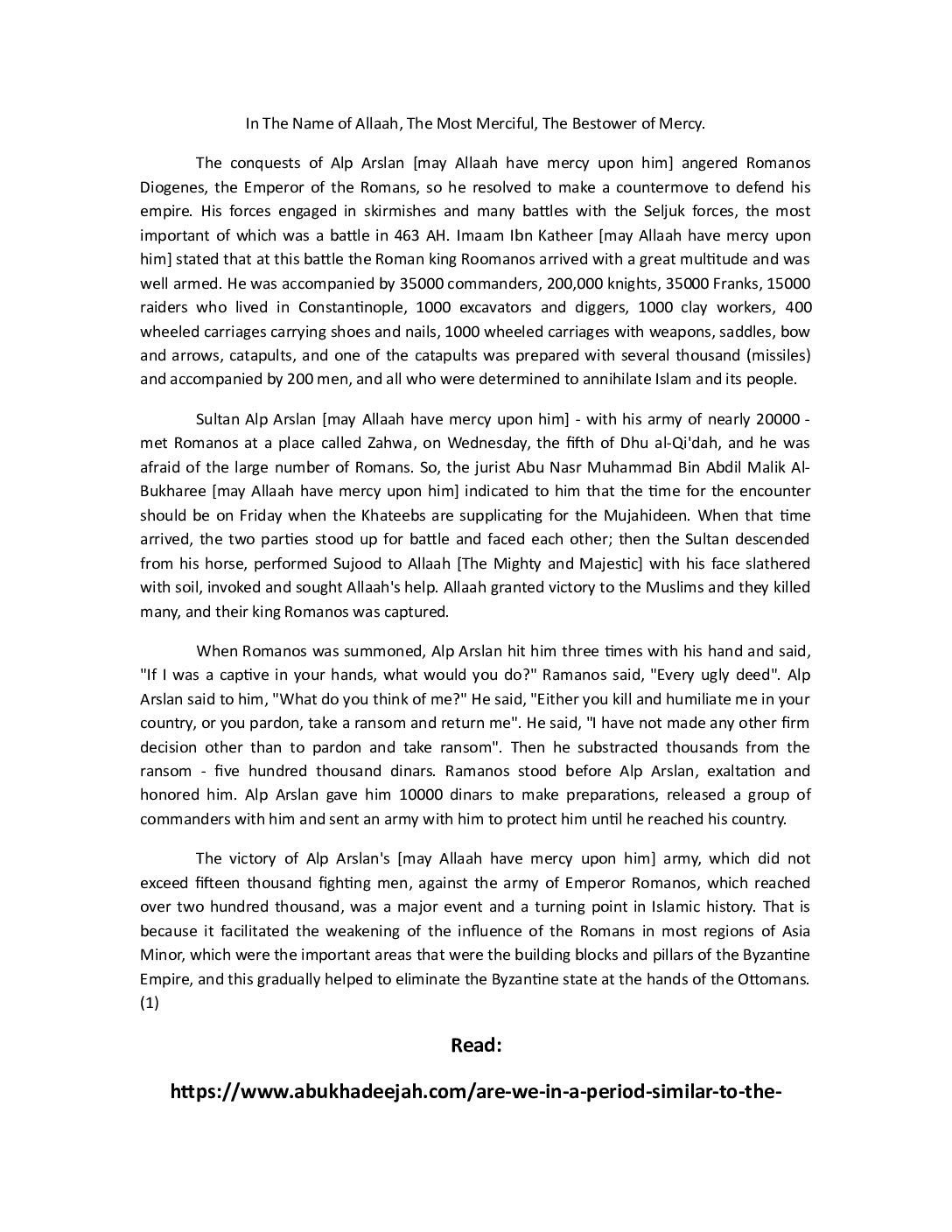Ibn Abdul Waahid advised Diyaa about recitation of the Qur’aan and seeking knowledge
Written by Abdullah Jallow on . Posted in Da'wah - Calling To Islam, Qur'aan, Scholars of Islam, Seeking Knowledge, The Salaf - Pious Predecessors, Worship - 'Ibaadah'.
Ibraaheem Ibn Abdul Waahid Al-Maqdisee (rahimahullaah) stated whilst advising Diyaa al-Maqdisee (rahimahullaah) when he (Diyaa) desired to travel and seek knowledge: ”Read the Qur’aan a lot and do not abandon it; for indeed it will make it easy for you to acquire (the knowledge) you seek in proportion to what you read.” Diyaa (rahimahullaah) then said: ”I did see and experience (what Ibraaheem advised me); for when I used to read a lot of (Qur’aan), it was easy for me to listen and write down a lot of hadeeth. And when I did not read (a lot), it was not easy for me.”
[Source: ذيل طبقات الحنابلةof Ibn Rajab (rahimahullaah) 3/205]
Imaam Tirmidhi’s (rahimahullaah) Rulings on Ahaadeeth [Brief comment by Shaikh Muhammad Bin Haadi]
Written by Salafi Dawah Manchester on . Posted in Scholars of Islam, Seeking Knowledge.
Shaikh Muhammed ibn Haadee (may Allaah preserve him) was asked whether the ruling of at-Tirmidhee when he makes a hadeeth “Saheeh” can be relied up. He answered: At-Tirmidhee’s rulings of Saheeh upon a hadeeth are stronger than his Hasan rulings. Also, he has been described as somewhat lenient. So when looking at Imaam at-Tirmidhee one should look to see who agrees with him from the well-known and bonafide scholars of hadeeth. [Source: https://twitter.com/AbuKhadeejahSP]
Updated: Question to Sh. Hassan Al-Banna On Women Setting Up Da’wah Groups & Duroos
Written by Salafi Dawah Manchester on . Posted in Da'wah - Calling To Islam, Family & Women, Fatawa-Rulings, Methodology - 'Manhaj', Scholars of Islam, Seeking Knowledge.
Link to Audio: CLICK HERE
Question:
Our Shaykh, the question is: Here in the west, particularly in America, Canada, and Britain, we have well-known Salafee Masaajid, and centers; classes and lectures are held therein with some of the students of knowledge and visiting scholars whenever possible. When this is the case, is it okay for the women who live near to these Salafee centers to establish Da’wah groups distinct from the centers and Masaajid in their areas, in which the people are gathered upon good?
And what is your advice to the women who are the founders of these organizations?
Answer:
It is incumbent that they ask the men and not suffice with their (own) knowledge; because the knowledge of the women is deficient. They have to ask the men. When she has a problem then she must ask (the men) and when there is a matter which is common and easy which everyone knows, then she can speak regarding it. As for in cases of necessity in which there is a question then she is to ask a Shaykh and take from him; either by way of the telephone or when a Shaykh comes to them then she can ask him. The women may have distinct lessons, but it is a must that scholars supervise them, even if by way of the telephone. And they are to ask them.
However, the woman is not to suffice with herself; because the men have learned and are able to study and travel to the lands and that is not easy for the women. So it is a MUST that she refer to the men.
Perhaps she may say: “I am a Shaykhah!” Huh? You are a Shaykhah? You have studied?
You are (but) a student; a student of knowledge. Allaahul-Musta’aan. May Allaah bless you and may Allaah reward you with good.
Questioner:
May Allaah give you life; may Allaah reward you, our Shaykh.
Shaykh Adds:
The Prophet (upon him be prayers and peace) said: “Convey from me, even if only one verse.” The woman may convey. If you know a verse; you understand it and you act upon it, then mention it to the people. Similarly for the woman; she may speak with it to the people.
HOWEVER, sitting and giving lessons all day and the people coming to her, she does not have the ability to do this. She has other more important matters; (such as) the children; the home; her husband; and so on. They are affairs which every woman knows their value. The role of the woman is great in the cultivation of the children; and Islaam has given her a great station; and that is remaining within the home; and she is (therein) an Ameerah! She cultivates the children upon good. However, she is not like the European woman, doing whatever she wants; no. All of it is within the limits of the Sharee’ah. And may Allaah bless you and reward you with good.
Translated by Raha ibn Donald Batts
Specifying Takbeer on the days of Eed – Imaam Naasirud-Deen al Albani (rahimahullaah)
Written by Abdullah Jallow on . Posted in Da'wah - Calling To Islam, Fatawa-Rulings, Hajj, Dhul Hijjah, Eid al Adha, Islamic Jurisprudence - 'Fiqh', Scholars of Islam, Seeking Knowledge, Worship - 'Ibaadah'.
See File:
Specifying takbeer on the days of `Eid to being after the Prayers -Shaikh al-Albaanee
[may Allaah reward our brother Abu Abdir-Rahmaan (Mus’ab) for emailing us this beneficial reminder]
Abu Usaama Attributes Bidah to some of the Companions–Ustaadh Bilaal Davis Clarifies
Written by Salafi Dawah Manchester on . Posted in Aqeedah (Creed & Belief), Da'wah - Calling To Islam, Deviated Callers & Individuals, Innovations In Islam (Bidah), Methodology - 'Manhaj', Refutations, Seeking Knowledge.
Lecture by Ustaadh Khashiff Khan (may Allaah preserve him)
Written by Salafi Dawah Manchester on . Posted in Brotherhood, Da'wah - Calling To Islam, Methodology - 'Manhaj', Refutations, Seeking Knowledge.
Are there no Students of Knowledge in the UK? Shaykh Muhammad Madkhali on Abu Hakeem Bilal Davies
Written by Abdullah Jallow on . Posted in Brotherhood, Da'wah - Calling To Islam, Family & Women, Methodology - 'Manhaj', Morals and Manners - 'Akhlaaq', Seeking Knowledge.
In The Name of Allaah, The Most Merciful, The Bestower of Mercy
Shaykh Muhammed ibn Haadi al Madkhali:
”Indeed our brother for the sake of Allah Bilal Abu Hakeem is from the brothers that I have known from Britain and I have likewise taught him in his third year of study in the Faculty of Hadeeth in the Islamic University. He is a student of Knowledge who has good character and religion and he is from those who deserve to be aided.”
Ustaadh Abu Hakeem (may Allaah preserve him) stated:
To add to the list of books mentioned earlier that our Shaikh (i.e. Shaikh Ubaid) has taught, during the time that I made Mulaazama (i.e. constantly attended his lessons and sittings) of the shaikh in Madina(from 1994 till 2004)while i was studying in the university, our shaikh taught the following:
1.Sharhus sunnah of imaam barbahaari more than once
2.Vol 1 and some of vol 2 of sharh usool i’tiqaad ahlus sunnati wal jamaa’ah of al-lalakaa’ie
3.As sunnah of Ibn abee ‘aasim
4.Vol 1 and some of vol 2 of Al Ibaanatul kubraa of Ibn Battah
5.Mukhtasir saheeh muslim
6.Umdatul ahkaam more than once
7.Al ‘Udah in Fiqh.
9.Qasbus sukr in Mustalah(science of hadeeth)
10 Talkheesul hamawiyah
11.Fathul majeed (the explanation of kitaabut tawheed) more than once
12.Lumatul i’tiqaad of ibn qudaama
13.Vol 1 of sharh ibn ‘Aqeel (The explanation of Alfiyah ibn maalik) in nahw (arabic grammer)
14. The masaa’il and rasaa’il of Imaam Ahmad
15.’Al Mudhakirrah (in usoolul fiqh) of Sh Muhammad Ameen Ash-Shanqitee
http://www.salafitalk.net/st/viewmessages.cfm?Forum=14&Topic=6397
Scholarly Clarification [Statement utilized by hizbiyyoon to protect figureheads of bidah]
Written by Abdullah Jallow on . Posted in Da'wah - Calling To Islam, Deviated Callers & Individuals, Deviated Groups, Sects and Parties, Methodology - 'Manhaj', Morals and Manners - 'Akhlaaq', Refutations, Scholars of Islam, Seeking Knowledge.
In The Name of Allaah, The Most Merciful, The Bestower of Mercy
Chapter: The prohibition of reviling the deceased without right or a legitimate (overriding) benefit
The deceased—that is the deceased amongst the Muslims (i.e. in general they are not to be reviled). As for a disbeliever there is no sanctity for him except if reviling him will harm those of his relatives who are alive, then he is not reviled. And if there is no harm (in reviling him), then he has no sanctity and this is the meaning of the statement of the author [i.e. Imaam Nawawi]’’Without Right;’’ because we have a right to revile those dead disbelievers, who harmed the Muslims, fought against them and strove to corrupt their religion.
‘Or (without) a legitimate (overriding) benefit;’’ (i.e. not to revile the dead unless there is a legitimate overriding benefit in doing so); such as when this deceased person was a person of innovation and he has already disseminated it (i.e. his innovation) and disseminated it amongst the people, so here there is a benefit to revile him, warn against him and his path, so that the people are not mislead by him. [Sharh Riyaadus Saaliheen 6/230 of Imaam Muhammad Bin Saaleh Al-Uthaymeen] http://www.sahab.net/forums/index.php?showtopic=124263// <










